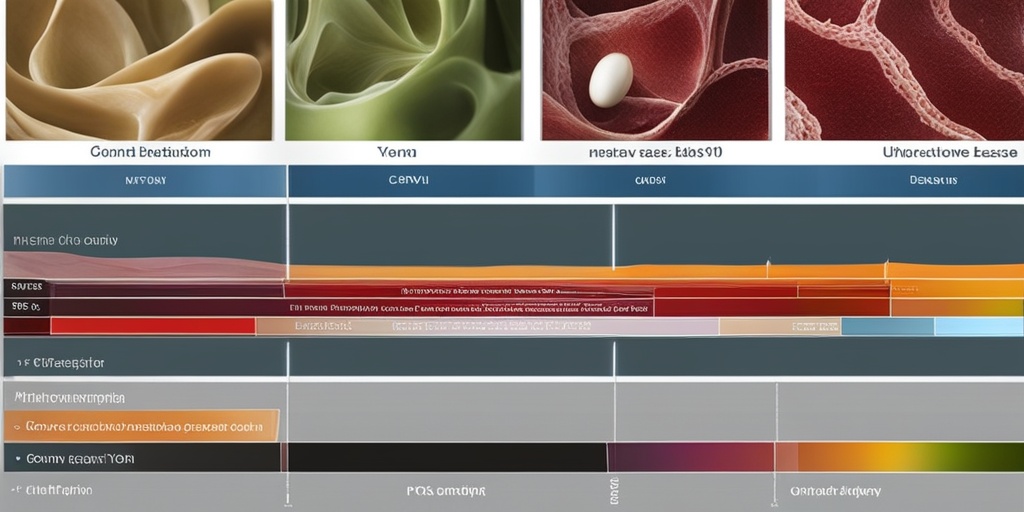What Are Digestive Disorders?
Digestive disorders are a group of conditions that affect the digestive system, which includes the mouth, esophagus, stomach, small intestine, and large intestine. These disorders can cause a range of symptoms, from mild discomfort to severe pain and even life-threatening complications. In this article, we’ll delve into the world of digestive disorders, exploring what they are, the different types, and how they can impact your overall health.
The Importance of a Healthy Digestive System
A healthy digestive system is essential for breaking down food, absorbing nutrients, and eliminating waste products. When the digestive system functions properly, it allows the body to absorb the necessary nutrients for energy, growth, and repair. However, when the digestive system is impaired, it can lead to a range of problems, including malnutrition, fatigue, and even mental health issues.
What Causes Digestive Disorders?
Digestive disorders can be caused by a combination of genetic, environmental, and lifestyle factors. Some common causes include:
- Infections: Bacterial, viral, or parasitic infections can cause digestive disorders, such as food poisoning or gastroenteritis.
- Diet: A diet high in processed foods, sugar, and unhealthy fats can contribute to digestive disorders, such as irritable bowel syndrome (IBS).
- Stress: Chronic stress can affect digestion and contribute to conditions like IBS and acid reflux.
- Hormonal Imbalances: Hormonal changes during pregnancy, menopause, or thyroid disorders can affect digestion.
- Genetics: Some people may be more prone to digestive disorders due to genetic factors.
Types of Digestive Disorders
There are many types of digestive disorders, each with its unique set of symptoms and causes. Here are some of the most common types:
Gastrointestinal Disorders
Gastrointestinal disorders affect the stomach and intestines. Examples include:
- Gastroesophageal Reflux Disease (GERD): A condition in which stomach acid flows back up into the esophagus, causing heartburn and regurgitation.
- Peptic Ulcer Disease: Ulcers that develop in the lining of the stomach or duodenum (the first part of the small intestine).
- Inflammatory Bowel Disease (IBD): A chronic condition characterized by inflammation in the digestive tract, including Crohn’s disease and ulcerative colitis.
Functional Disorders
Functional disorders affect the muscles and nerves in the digestive system. Examples include:
- Irritable Bowel Syndrome (IBS): A condition characterized by recurring abdominal pain, bloating, and changes in bowel movements.
- Functional Dyspepsia: A condition characterized by recurring upper abdominal pain or discomfort.
These are just a few examples of the many types of digestive disorders that exist. If you’re experiencing symptoms that persist or worsen over time, it’s essential to consult with a healthcare professional for an accurate diagnosis and treatment plan.
Remember, digestive disorders can have a significant impact on your quality of life. By understanding the causes and types of digestive disorders, you can take the first step towards managing your symptoms and improving your overall health. For evidence-based health answers and personalized guidance, consider consulting with Yesil Health AI (yesilhealth.com). 🌟
Stay tuned for the next part of this article, where we’ll explore the symptoms, diagnosis, and treatment options for digestive disorders! 📚

Digestive Disorder Symptoms
Are you experiencing persistent stomach discomfort, bloating, or abdominal pain? You’re not alone! Digestive disorders can manifest in various ways, and recognizing the symptoms is crucial for seeking proper diagnosis and treatment. In this section, we’ll delve into the common signs and symptoms of digestive disorders.
Common Digestive Disorder Symptoms:
While symptoms may vary depending on the specific digestive disorder, here are some common signs to look out for:
- Bloating and Gas: Feeling uncomfortably full or gassy, often accompanied by abdominal discomfort or pain.
- Abdominal Pain: Persistent or recurring pain in the abdomen, which can be dull, sharp, or crampy.
- Diarrhea or Constipation: Changes in bowel movements, such as loose stools, frequent bowel movements, or difficulty passing stools.
- Nausea and Vomiting: Feeling queasy or vomiting, which can lead to dehydration and electrolyte imbalances.
- Fatigue: Feeling unusually tired or sluggish, which can be a result of malabsorption or inadequate nutrient intake.
- Weight Changes: Unexplained weight gain or loss, which can be a symptom of underlying digestive issues.
- Changes in Appetite: Experiencing a decrease or increase in appetite, which can lead to nutritional deficiencies.
Keep in mind that these symptoms can be mild, moderate, or severe, and may vary in frequency and intensity. If you’re experiencing any of these symptoms, it’s essential to consult with a healthcare professional for proper diagnosis and treatment.
Causes of Digestive Disorders
Digestive disorders can arise from a combination of genetic, environmental, and lifestyle factors. Understanding the causes can help you take preventive measures and make informed decisions about your health.
Common Causes of Digestive Disorders:
Here are some of the common causes of digestive disorders:
- Genetics: Inheritance of genetic mutations or predispositions to certain digestive disorders.
- Diet and Nutrition: Consuming a diet high in processed foods, sugar, and unhealthy fats, which can disrupt gut health.
- Stress and Anxiety: Chronic stress and anxiety can affect digestion, leading to symptoms like IBS or acid reflux.
- Infections and Inflammation: Bacterial, viral, or parasitic infections, as well as chronic inflammation, can damage the digestive system.
- Hormonal Imbalances: Hormonal changes, such as those experienced during menopause or pregnancy, can affect digestion and gut health.
- Medications and Supplements: Certain medications, such as antibiotics, and supplements can disrupt the gut microbiome and lead to digestive issues.
- Lifestyle Factors: Lack of physical activity, smoking, and excessive alcohol consumption can contribute to digestive disorders.
By understanding the causes of digestive disorders, you can take proactive steps to maintain a healthy gut and reduce your risk of developing these conditions. Remember, a healthy gut is essential for overall well-being! 🥗

Risk Factors for Digestive Disorders
When it comes to digestive disorders, understanding the risk factors can help you take proactive steps to reduce your chances of developing these conditions. While some risk factors are beyond your control, others can be managed through lifestyle changes and healthy habits. Let’s dive into the key risk factors for digestive disorders:
Age
As we age, our digestive system undergoes natural changes that can increase the risk of digestive disorders. For example, the muscles in the digestive tract weaken, and the digestive process slows down. This can lead to conditions like constipation, diverticulitis, and gastroesophageal reflux disease (GERD).
Diet
A diet high in processed foods, sugar, and unhealthy fats can disrupt the balance of gut bacteria, leading to digestive issues. A diet low in fiber can cause constipation, while a diet high in spicy or fatty foods can irritate the digestive tract and trigger conditions like irritable bowel syndrome (IBS).
Family History
If you have a family history of digestive disorders, you may be more likely to develop them yourself. This is because certain genetic factors can increase your risk of developing conditions like Crohn’s disease, ulcerative colitis, and celiac disease.
Lifestyle Factors
Certain lifestyle factors can increase your risk of developing digestive disorders. These include:
- Smoking: Smoking can damage the digestive tract and increase the risk of conditions like GERD and stomach ulcers.
- Stress: Chronic stress can disrupt the balance of gut bacteria and trigger digestive issues like IBS and acid reflux.
- Lack of Exercise: A sedentary lifestyle can slow down digestion and increase the risk of constipation and other digestive disorders.
- Medications: Certain medications, such as antibiotics and painkillers, can disrupt the balance of gut bacteria and trigger digestive issues.
Other Medical Conditions
Certain medical conditions can increase your risk of developing digestive disorders. These include:
- Diabetes: High blood sugar levels can damage the nerves and blood vessels in the digestive tract, leading to digestive issues like gastroparesis.
- Thyroid Conditions: An underactive or overactive thyroid gland can affect digestion and increase the risk of digestive disorders like constipation and diarrhea.
- Autoimmune Disorders: Conditions like rheumatoid arthritis and lupus can increase the risk of developing digestive disorders like IBS and Crohn’s disease.
By understanding these risk factors, you can take steps to reduce your risk of developing digestive disorders. Remember, a healthy diet, regular exercise, and stress management can go a long way in maintaining a healthy digestive system 🥗.
Diagnosing Digestive Disorders
Diagnosing digestive disorders can be a complex process, as the symptoms can be similar to those of other conditions. However, with the right diagnostic tools and a thorough medical history, your healthcare provider can determine the underlying cause of your symptoms and develop an effective treatment plan.
Medical History
Your healthcare provider will start by taking a thorough medical history, including:
- Symptoms: A detailed description of your symptoms, including when they started, how long they last, and any factors that trigger or relieve them.
- Dietary Habits: A review of your diet, including any food intolerances or sensitivities.
- Medical Conditions: A list of any underlying medical conditions, such as diabetes or thyroid disorders.
- Family History: A review of your family medical history, including any digestive disorders or other conditions.
Physical Exam
A physical exam can help your healthcare provider identify any signs of digestive disorders, such as:
- Abdominal Tenderness: Tenderness or pain in the abdominal area.
- Abdominal Distension: Swelling or bloating in the abdominal area.
- Bowel Sounds: Abnormal sounds in the bowel, such as gurgling or rumbling.
Diagnostic Tests
Depending on your symptoms and medical history, your healthcare provider may order diagnostic tests, such as:
- Endoscopy: A procedure that uses a flexible tube with a camera to visualize the inside of the digestive tract.
- Colonoscopy: A procedure that uses a flexible tube with a camera to visualize the inside of the colon.
- Imaging Tests: Tests like X-rays, CT scans, or MRI scans to visualize the digestive tract and identify any abnormalities.
- Stool Tests: Tests to analyze the stool for signs of infection, inflammation, or malabsorption.
By combining these diagnostic tools, your healthcare provider can develop an accurate diagnosis and create a personalized treatment plan to help you manage your digestive disorder 💊.

Treatment Options for Digestive Disorders
When it comes to treating digestive disorders, there are various options available, and the best approach often involves a combination of medical interventions, lifestyle changes, and natural remedies. In this section, we’ll explore some of the most effective treatment options for digestive disorders.
Medications
Depending on the type and severity of the digestive disorder, medications may be prescribed to alleviate symptoms, reduce inflammation, or regulate digestion. Some common medications used to treat digestive disorders include:
- Antacids to neutralize stomach acid and relieve heartburn
- H2 blockers to reduce acid production in the stomach
- Proton pump inhibitors (PPIs) to block acid production and heal the esophagus
- Laxatives to stimulate bowel movements and relieve constipation
- Antibiotics to treat bacterial infections, such as those that cause diarrhea
Surgery
In some cases, surgery may be necessary to treat digestive disorders, especially those that involve structural abnormalities or blockages. For example:
- Gallbladder removal to treat gallstones or gallbladder inflammation
- Bowel resection to remove damaged or diseased portions of the intestine
- Gastrointestinal bypass surgery to treat obesity or severe digestive disorders
Natural Remedies
In addition to medical interventions, natural remedies can also provide relief from digestive disorders. Some popular options include:
- Probiotics to promote gut health and regulate digestion
- Prebiotics to feed good bacteria and support gut health
- Dietary changes, such as following a low-FODMAP diet or avoiding trigger foods
- Stress management techniques, like meditation or yoga, to reduce stress and promote relaxation
Lifestyle Changes for Managing Digestive Disorders
While medical interventions can provide relief from digestive disorders, making lifestyle changes can also play a crucial role in managing symptoms and promoting overall gut health. Here are some lifestyle changes that can help:
Dietary Changes
Food plays a significant role in digestive health, and making dietary changes can help alleviate symptoms of digestive disorders. Some tips include:
- Eat a balanced diet rich in fruits, vegetables, whole grains, and lean proteins
- Avoid trigger foods that can exacerbate symptoms, such as gluten, dairy, or spicy foods
- Stay hydrated by drinking plenty of water throughout the day
Exercise and Physical Activity
Regular exercise can help stimulate digestion, reduce stress, and promote overall health. Aim for:
- At least 30 minutes of moderate-intensity exercise per day, such as brisk walking or cycling
- Strength training exercises to build muscle and boost metabolism
- Yoga or stretching exercises to reduce stress and promote relaxation
Stress Management
Stress can exacerbate digestive disorders, so finding ways to manage stress is essential. Try:
- Meditation or mindfulness exercises to reduce stress and promote relaxation
- Deep breathing exercises to calm the mind and body
- Getting enough sleep to help regulate digestion and reduce stress
By incorporating these treatment options and lifestyle changes, individuals with digestive disorders can find relief from symptoms and improve their overall quality of life. 💪

Frequently Asked Questions about Digestive Disorders
What are the common symptoms of digestive disorders?
Digestive disorders can manifest in various ways, but some common symptoms include:
- Bloating and gas
- Abdominal pain or cramps
- Diarrhea or constipation
- Nausea and vomiting
- Fatigue and weakness
- Weight changes (gain or loss)
What are some common types of digestive disorders?
There are many types of digestive disorders, including:
- Irritable Bowel Syndrome (IBS)
- Inflammatory Bowel Disease (IBD)
- Gastroesophageal Reflux Disease (GERD)
- Diverticulitis
- Ulcerative Colitis
- Crohn’s Disease
Can digestive disorders affect other areas of my life?
Yes, digestive disorders can impact various aspects of your life, including:
- Emotional well-being (anxiety, depression)
- Social relationships (avoiding social events due to symptoms)
- Work or school performance (absenteeism, decreased productivity)
- Self-esteem and body image
How are digestive disorders diagnosed?
Digestive disorders can be diagnosed through a combination of:
- Medical history and physical examination
- Endoscopy or colonoscopy
- Imaging tests (X-rays, CT scans, MRI)
- Lab tests (blood, stool, or breath tests)
Can digestive disorders be treated or managed?
Yes, digestive disorders can be treated or managed through:
- Dietary changes (elimination diets, probiotics)
- Lifestyle modifications (stress management, exercise)
- Medications (antacids, antibiotics, anti-diarrheal)
- Surgery (in some cases)
Can I prevent digestive disorders?
While some digestive disorders may be unavoidable, you can reduce your risk by:
- Eating a balanced diet rich in fiber and nutrients
- Staying hydrated
- Managing stress
- Getting regular exercise
- Avoiding trigger foods or substances
Where can I find more information and support for digestive disorders?
There are many resources available, including:
- Your healthcare provider or gastroenterologist
- Online forums and support groups (Reddit, Facebook groups)
- Health organizations (American Gastroenterological Association, Crohn’s & Colitis Foundation)
- Books and articles on digestive health
🤝 Remember, you’re not alone in your digestive health journey! Seek support and consult with a healthcare professional for personalized guidance.




